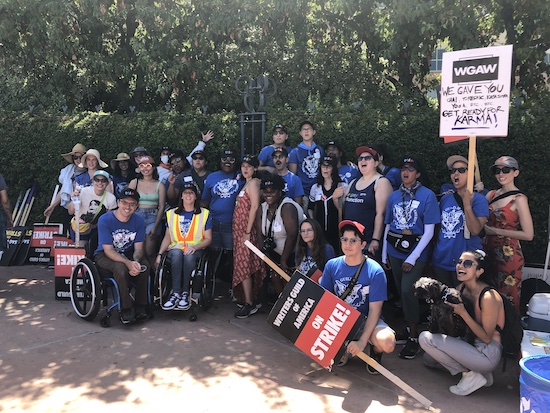TTIE Leaders Explain the WGA Strike Stakes for Historically Excluded Writers
July 31, 2023 by Marisa Roffman

TTIE members at the picket on Friday, July 28. Photo credit: Marisa Roffman
On Friday, July 28, members of Think Tank for Inclusion & Equity—or TTIE—gathered to picket outside of Disney in Burbank.
“We’re a group of intersectional working—when we’re not striking—writers from all levels and all backgrounds working to increase inclusion, equity, and accessibility inside rooms, as well as champion authentic and responsible storytelling,” Maha Chehlaoui, who serves as TTIE’s program director, tells Give Me My Remote. “We started doing that first through our behind-the-scenes survey, which is the only survey and report of its kind, which takes into account the experiences of working writers inside rooms, in development, getting in, moving in, and moving up—or not—inside the industry. And from the data we gleaned, we created the rest of our programming, including fact sheets that a lot of folks have run into in writers’ rooms, as well as community-building events, roundtables with different segments of the industry, and training programs.”
With the WGA strike about to enter its third month—and the studios yet to engage in negotiations with the WGA or SAG-AFTRA, whose own strike began in mid-July, since their contracts expired—the stakes are high for the historically excluded (women, BIPOC, LGBTQIA+, disabled people) scribes.
“Everything the guild is proposing impacts historically excluded writers harder,” TTIE co-chair Angela Harvey, whose credits include STATION 19 and AMERICAN HORROR STORIES, says. “Specifically room sizes, [that] is going to hit lower and mid-level writers harder, which is where the majority of the historically excluded writers are. So those are the jobs they’re trying to squeeze out and make into gig work. Throughout the whole pipeline, they want to squeeze and make it gig work, but it impacts those careers hardest. We just threw the doors open three years ago; folks have not had the time to get a good foothold.”
“The guild is doing a fantastic job of highlighting the sustainable career, the sustainable industry, which obviously we are in 100 percent solidarity with,” she continues. “But we also want to underscore the cultural and moral imperatives that are involved in protecting our stories, as historically excluded communities. Those stories we generate are such a key part of culture and society. And protecting our voices: we’re just now starting to get to tell some of these stories. We’re just now starting to explore the whole breadth of what it means to be human, what it means to be an American, and now they want to cut it off and automate it. You just can’t do that. For lack of a better word, the spiritual element of story is fundamental to the human experience. Whether our studios realize it or not, that’s what they sell.”
As writers have been highlighting during the strike, the way the system is currently set up frequently does not allow lower level writers to get the needed experience for eventually running their own shows. (A training that used to be the norm/can happen more regularly on network shows.)
“The way that the current streaming model works is everything is written before production, and then they release a lot of the lower level writers and then they keep one or two [upper level] writers to do production,” TTIE co-chair/co-founder Y. Shireen Razack, whose credits include VAMPIRE ACADEMY, NEW AMSTERDAM, and SHADOWHUNTERS, notes. ”That means those lower level writers are not getting the skills they need in order to climb the ladder, to set up for success when they can be showrunners in the future. We need skilled showrunners in the future; we need skilled historically excluded showrunners.”
Adds Harvey: “And it’s valuable to the studios. If you want to protect your content, you want to protect the story, you need someone who is part of the origin of that story to shepherd it from beginning to end. Yes, it is training for tomorrow, but it’s a job, it needs to be covered. It’s very short-sighted of them to think they’re saving money by cutting out that role. It makes no sense.”
As the strike continues, TTIE has gathered a list of possible resources for writers to utilize, both in terms of financial and emotional support, as well as information about which picket lines are most accessible. “We are a rag-tag grassroots organization that is all about helping,” Harvey says. “The biggest support we provide is community…There are a lot of things we put on our website; we try to give everyone a one-stop shop so they can find the things they need. And for the folks who are able to give, we encourage them to give there so that those things stay viable.”
“The thing that has been really helpful for a lot of the historically excluded assistants and the lower level is they know about TTIE and they know that we are that resource for them,” adds Razack. “We’ve been very fortunate to provide that resource and be a place…sometimes they just need somebody to talk to, and we’re happy to do that.”
If fans can’t financially support the strike funds, “hit play,” Harvey encourages. “When a show drops that’s from a historically excluded person, or an independent film, anything that is made by historically excluded writers, hit play. The only things these folks are looking at is money and numbers. That’s what we need from fans.”
“Also, go on social media and tell the AMPTP why and how much you support the actors and the writers out here and how much you want us to go back to work with a fair contract,” Razack adds. “Because the audiences want the content. We’ve had people drive [past the picket lines] and go, ‘Please go back to work, I’m tired of reruns!’”
Plus, watch part of Think Tank for Inclusion & Equity communications captain Danny Tolli’s speech…
Follow @GiveMeMyRemote and @marisaroffman on Twitter for the latest TV news. Connect with other TV fans on GIVE ME MY REMOTE’s official Facebook page or our Instagram.
And be the first to see our exclusive videos by subscribing to our YouTube channel.
As an Amazon Associate we earn from qualifying purchases made through links/ads placed on the site.
Related Posts
Comments Off on TTIE Leaders Explain the WGA Strike Stakes for Historically Excluded Writers



Comments